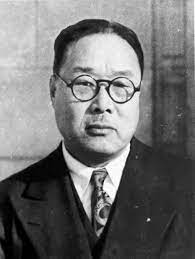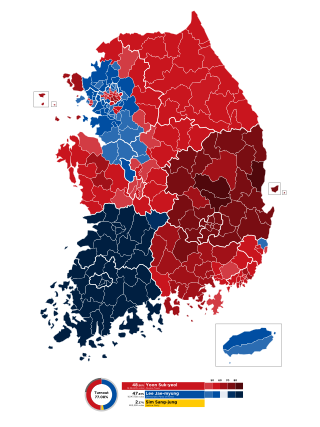
The president of the Republic of Korea,also known as the president of Korea,is both the head of state and head of government of the Republic of Korea. The president is elected by citizens of the Republic of Korea and pledges to execute the duties of their office,chief among others "to defend the State,pursue peaceful unification of the homeland." The president leads the State Council,is the chief of the executive branch of the national government and the commander-in-chief of the Republic of Korea Armed Forces.

Chung Dong-young is a politician and was the United New Democratic Party nominee for President of South Korea in 2007.

Kim Moon-soo is a South Korean politician currently serving as the current Chairperson of the Economic,Social and Labor Council (ESLC) of the Republic of Korea from September 30,2022. Previously,he was the 32nd Governor of Gyeonggi Province in South Korea. A former labor activist,he began his career in politics when he participated in the foundation of the People's Party in 1990. He was elected to the 15th National Assembly at Sosa-gu,Bucheon,as a candidate for the New Korea Party. After continuing to serve as a member of the assembly in the 16th and the 17th National Assemblies,he became the 4th Governor of Gyeonggi Province to be elected by popular vote in 2006.

Chung Un-chan is a South Korean politician who served as the 40th prime minister of South Korea from 2009 to 2010. He was a professor of Seoul National University from 1978 to 2009,serving as the president of the university from July 2002 to July 2006. From 2018 to 2020,Chung also served as the 22nd commissioner of the Korea Baseball Organization.

Presidential elections were held in South Korea on 18 December 1997. The result was a victory for opposition candidate Kim Dae-jung,who won with 40% of the vote. When he took office in 1998,it marked the first time in Korean history that the ruling party peacefully transferred power to the opposition party.

Yi Yun-young was an independence activist,educator,and Methodist minister during the Japanese occupation of Korea. His family clan originated in Danyang,and he was from Yongbyon in Pyonganbuk-do. His art name was Baeksa. During the March 1st Independence Movement,he was arrested for holding a lecture declaring independence and protesting against the Japanese occupation. In 1940,his pastoral qualifications were suspended because he opposed the unification of the churches in Korea and Japan and refused to adapt Sōshi-kaimei. After the Liberation,he participated with Cho Man-sik in the Committee for the Preparation of Korean Independence,founded the Korean Democratic Party,and was active as the party's vice leader. After his escape to the South,he was recommended as acting prime minister. After the establishment of Korea's government,he was named to be the first prime minister,but he was defeated because of the rejection of his confirmation by the Korea Democratic Party. After that,he was named to be the prime minister three more times,but each time he was rejected. Being one of Syngman Rhee's closest allies,he served as Minister without Portfolio and Minister of Social Affairs during the First Republic. He ran for vice president representing the anti-Lee Ki-poong faction but was defeated. After the May 16th Coup,he was Chairman of the Committee for Struggle against the prolongation of Military Government and executive member of the People's Party. He was an aide of Cho Man-sik,then after he defected to the South,he worked as an aide to Syngman Rhee.

Ahn Cheol-soo is a South Korean politician,medical doctor,businessperson,and software entrepreneur. He is a member of the National Assembly as part of the conservative People Power Party. Prior to his career in politics,Ahn founded AhnLab,Inc.,an antivirus software company,in 1995. He was chairman of the board and Chief Learning Officer of AhnLab until September 2012,and remains the company's largest stakeholder. Prior to entering politics,Ahn served as dean of the Graduate School of Convergence Science and Technology at Seoul National University until September 2012. Ahn was considered a left-wing politician when he entered politics in 2012,then considered a centrist politician by his 2017 presidential bid,and is now considered a right-wing politician.

Lee Hong-Koo is a South Korean former academic,politician,and think tank leader who served as Prime Minister of the Republic of Korea,South Korean Ambassador to the United Kingdom and United States,and founding Chairman of the East Asia Institute in Seoul.

Presidential elections were held in South Korea on 19 December 2012. They were the sixth presidential elections since democratization and the establishment of the Sixth Republic,and were held under a first-past-the-post system,in which there was a single round of voting and the candidate receiving the highest number of votes was elected. Under the South Korean constitution,a president is restricted to a single five-year term in office. The term of the then incumbent president Lee Myung-bak ended on 24 February 2013. According to the Korea Times,30.7 million people voted with turnout at 75.8%. Park Geun-hye of the Saenuri party was elected the first female South Korean president with 51.6% of the vote opposed to 48.0% for her opponent Moon Jae-in. Park's share of the vote was the highest won by any candidate since the beginning of free and fair direct elections in 1987 and the first such election in which any candidate won a majority. Moreover,as of the 2022 election,this is the latest South Korean presidential election in which the winning candidate won an absolute majority of the vote.

Early presidential elections were held in South Korea on 9 May 2017 following the impeachment and removal of Park Geun-hye. The elections were conducted in a single round,on a first-past-the-post basis,and had originally been scheduled for 20 December 2017. However,they were brought forward after the decision of the Constitutional Court on 10 March 2017 to uphold the National Assembly's impeachment of Park. Following procedures set out in the Constitution of South Korea,Prime Minister Hwang Kyo-ahn succeeded Park as the acting president. After Park was removed from office by the Constitutional Court's ruling,acting president Hwang announced he would not run for a term in his own right.

Legislative elections were held in South Korea on 13 April 2016. All 300 members of the National Assembly were elected,253 from first-past-the-post constituencies and 47 from proportional party lists. The election was an upset victory for the liberal Democratic Party,which defied opinion polling by winning a plurality of seats in the election and defeating the ruling conservative Saenuri Party by one seat. In votes for party lists,however,Democratic Party came third,behind the Saenuri Party in first place and the new People Party in second.

Ahn Hee-jung,also known as An Hee-jung,is a former South Korean politician and convicted felon. He served as the 36th and 37th Governor of South Chungcheong Province. He stepped down from his role as governor and announced his retirement from public life after acknowledging accusations that he sexually assaulted his aide Kim Ji-eun on multiple occasions. In February 2019,he was sentenced to a three-and-a-half-year prison term for sexual assault.

Lee Ki-taek was a South Korean politician and parliamentarian.

Lee Sang-kyu is a South Korean activist,labourer and politician. He was the Permanent President of the Minjung Party,a minor left-wing nationalist political party. He was elected as the Member of National Assembly for Gwanak 2nd constituency in 2012 but invalidated by court order in 2014.

Presidential elections were held in South Korea on 9 March 2022. Under the South Korean constitution,presidents are restricted to a single five-year term,meaning that incumbent president Moon Jae-in was ineligible to run for a second term. Opposition candidate Yoon Suk Yeol of the People Power Party won the election,defeating candidate Lee Jae-myung of the incumbent Democratic Party.

Jeon Hae-cheol is a South Korean lawyer and politician who served as the Minister of the Interior and Safety from 2020 to 2022. He formerly served as the Senior Secretary to the President for Civil Affairs from 2006 to 2007,under the then President Roh Moo-hyun.

The 2021 South Korean by-elections were held in South Korea on 7 April 2021. The National Election Commission announced on 2 March 2021,that the by-elections would be held for 21 public offices or electoral districts,including 2 Metropolitan mayors,2 Municipal mayors,8 Metropolitan Council constituencies,and 9 Municipal Council constituencies. Candidate registration ran from 18 to 19 March,and the list of candidates was confirmed on 26 March.

Han Dong-hoon is a South Korean politician and prosecutor who served as the leader of People Power Party from July to December 2024. He previously served as the 69th Minister of Justice from May 2022 to December 2023 under the cabinet of Yoon Suk Yeol.

Legislative elections were held in South Korea on 10 April 2024. All 300 members of the National Assembly were elected,254 from first-past-the-post constituencies and 46 from proportional party lists. The two largest parties,the liberal Democratic Party and the conservative People Power Party,once again set up satellite parties to take advantage of the electoral system.
Park Chan-jong' is a politician of South Korea,and a member of the 9th,10th,12th,13th,and 14th National Assembly. His pen name is Udang (尤堂).



















